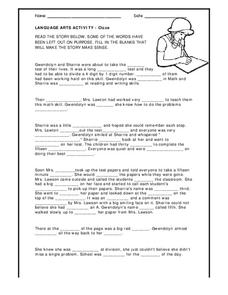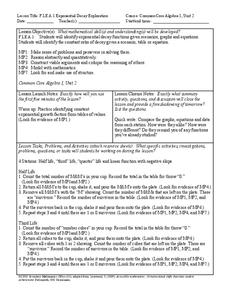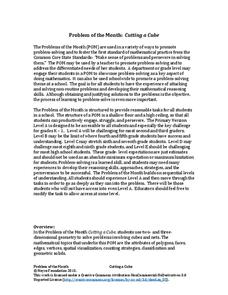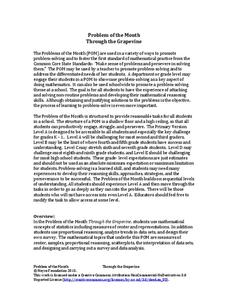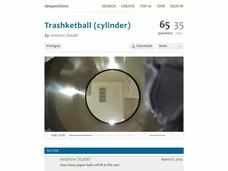Scholastic
Study Jams! Prime Factorization
Deepen the number sense of young mathematicians by exploring the process of prime factorization. Follow along with this step-by-step presentation that explains how factor trees are used to break a composite number down into its prime...
American Statistical Association
Chunk it!
Chunking information helps you remember that information longer. A hands-on activity tests this theory by having learners collect and analyze their own data. Following their conclusions, they conduct randomization simulations to...
Curated OER
It's Not All Greek to Me
Learners find out the meaning for prefixes used in math vocabulary. By dissecting words used in everyday math, they figure out what the prefix indicates and what the word means. A variety of well-organized worksheets and activities...
Houghton Mifflin Harcourt
Look at Us!: English Language Development Lessons (Theme 1)
Start off your young English language learners with this packet of materials, which covers three weeks of instructions. After completing the unit, kids will have practiced the letters K through Z, read several story books, talked with...
Curated OER
Mystery Number
Young scholars explore numbers 1-100. In this cross curriculum literacy and numeration lesson, students listen to the book More or Less by Stuart J. Murphy. Young scholars play a game with a partner in which they guess the "mystery...
Curated OER
Find the Even Numbers 5
For this online interactive number sense worksheet, students examine a series of 1 and 2-digit numbers. Students identify the even numbers in the series and check their answers.
Curated OER
Expanded Form - Ten Thousands
Young scholars investigate the place values of different numbers by completing a worksheet. In this number sense lesson plan, students discover the ten thousands digit on a number and practice writing numbers in an expanded form....
Bright Hub Education
Math Lesson for Visually Impaired Early Learners: A 3 Way Counting Activity
A unique lesson that's designed for visually impaired early learners, but can be adapted for anyone, is here for you. Pupils use brightly colored foam letters, beads, checkers, and an abacus, in order to gain practice in identifying the...
Curated OER
Numeracy
Students review numbers, number systems and the number operations through the use of online webpages.
Differentiation Central
Perimeter and Area
Leave no student behind with this differentiated geometry unit on perimeter and area. Over the course of five lessons, young mathematicians explore these foundational concepts through a series of self-selected hands-on activities and...
EduGAINs
Discovery of Pi
Serve up a slice of math for Pi Day! A combination of fun, hands-on lessons and helpful worksheets encourage learners to practice finding the radius, diameter, and circumference of different circles.
Illustrative Mathematics
Jog-A-Thon
Adding fractions with unlike denominators can be cloudy, but attaching the fractions to real-life math can add to fraction number sense. Alex needed to run only a mile, will completing the training in two segments satisfy this...
Mrs. Burke's Math Page
The Amazing Pi Race
Add a sense of excitement to your math class with this race across the country. Using their knowledge of all things circular, young mathematicians work in pairs answering a series of pi-related word problems as they hop from one city to...
Curated OER
Egyptian Fractions
You don't have to be an ancient Egyptian to decipher fractions in this activity that focuses on adding fractions with unlike denominators and developing fraction number sense. Egyptians represented fractions differently than we do. They...
Statistics Education Web
It’s Elemental! Sampling from the Periodic Table
How random is random? Demonstrate the different random sampling methods using a hands-on activity. Pupils use various sampling techniques to choose a random sample of elements from the periodic table. They use the different samples to...
Teach-nology
Language Arts Activity - Cloze
Using context clues is an important skill when mastering reading comprehension. A cloze activity prompts learners to read each sentence in a short passage and fill in the blanks, based on what the rest of the sentence says.
West Contra Costa Unified School District
Matching Quadratic Functions
Ever sigh when learners ask why they have to know so many different forms of the quadratic equation? Here is a lesson that comes in handy! Using hands-on matching activities, quadratic equations are explored through...
Howard County Schools
Exponential Decay Exploration
How can you model exponential decay? Explore different situations involving exponential decay functions and decreasing linear functions by performing activities with MandM candy, popcorn kernels, and number cubes.
Curated OER
Integers - Objects Model
Sixth and seventh graders solve 19 various types of problems related to integers as objects models. They write an integer that corresponds to each letter on a number line and then, arrange the integers from least to greatest. Pupils also...
Noyce Foundation
Cutting a Cube
Teach the ins and outs of the cube! A series of five K–12 level activities explore the make-up of the cube. The beginning lessons focus on the vocabulary related to the cube. Later lessons explore the possible nets that describe a cube....
Noyce Foundation
Through the Grapevine
Teach statistics by analyzing raisins. A thorough activity provides lesson resources for five levels to include all grades. Younger pupils work on counting and estimation, mid-level learners build on their understanding of the measures...
Noyce Foundation
Miles of Tiles
Create number sentences and equations to solve geometric problems. Each activity in the series of five asks young mathematicians to consider different-sized tiles to build structures according to specific criteria. The first activities,...
101 Questions
Trashketball
Take a shot using a lesson on volume! Young learners watch a video showing a trashcan filling with paper balls. The task is to calculate the number of paper balls that will fit in the can. Pupils use volume calculations to make a...
American Statistical Association
You and Michael
Investigate the relationship between height and arm span. Young statisticians measure the heights and arm spans of each class member and create a scatter plot using the data. They draw a line of best fit and use its slope to explain the...















